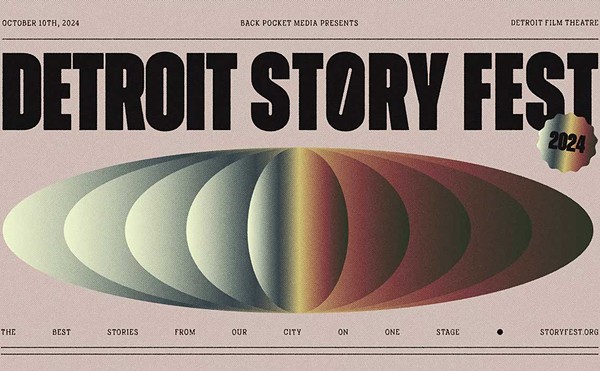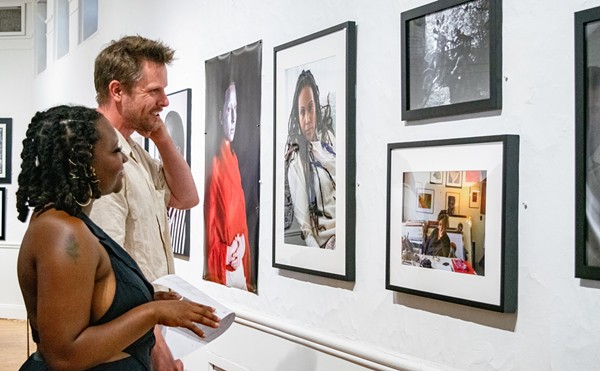Some history: From the 1920s through the late '50s, Paradise Valley was Detroit's African-American arts and entertainment hub. It was also the home of African-American heroes, including boxer Joe Louis, bluesman John Lee Hooker, poet Robert Hayden (Elegies for Paradise Valley) and civil rights icon Rosa Parks. At its peak, the Valley was Detroit's answer to Harlem. It was ghetto and loud, violent and beautiful, bustling on the margins of the Motor City; it was the home of vice, religion and political discourse; it birthed the Nation of Islam. Jazz greats the likes of Ella Fitzgerald and Billie Holiday, Cab Calloway and Charlie Parker would play the Valley — or stay there because white hotels wouldn't put them up. But by 1960, the neighborhood's main vein, Hastings Street, was leveled to make room for I-75. It was a move that forever changed Detroit's cultural and physical landscape, especially for the city's African-American artists.
By 2007, Paradise Valley lived only in poems, blues hollers and dusty snapshots. In spring of that year, city planners declared that Harmonie Park (a small but neat neighborhood that throughout the mid to late 19th and early 20th century was called Germantown) would be re-branded as Paradise Valley. But it wasn't until this summer that the neighborhood took on some of its namesake soul; that is, when the Arts League of Michigan took over the 115-year-old Harmonie Club on East Grand River Avenue. Named after past Arts League board member and president of United Way Southeastern Michigan, the Virgil H. Carr Cultural Arts Center opened its doors in July.
Oliver Ragsdale Jr., president of the Arts League of Michigan, is a classically trained percussionist turned career arts administrator. Hired originally as a consultant for Highland Park Community College 20 years ago, in an effort to better service the African-American arts community, the privately operated League was born out of ideas for change that died out in the face of political and financial hardships found in the public sector. His novel concept was to create an arts incubator. The Detroit Metropolitan Orchestra, Detroit Jazz Orchestra, Brazil Dennard Chorale and locally revered saxophonist Donald Walden were all on board. Ragsdale felt that more could be done.
"After realizing we could be serving hundreds of artists annually, we had to switch gears and re-focus just what we were doing and what could be done," he says.
The organization needed a proper home. Ironically, in a city now infamous for abandoned buildings, finding the right one proved difficult. After 19 years and several evolutions, the Arts League of Michigan not only found quarters but a clear course of action.
"The journey that we went on was sort of like the 40 years with the Israelites — our journey to find a home educated us and grew us," says Ragsdale, who first saw the building in 2001, lost it to the Detroit Lions in 2002, and re-claimed it in 2007. Having gone through the planning for a building that was set to break ground in the Cultural Center, the League owned a construction design for 47,500 square feet of space. That deal fell though. The Harmonie Club's 40,000 square feet, Ragsdale says, gave them 75 percent of their plan for a third of the cost.
"Ford and the Lions had renovated the building and poured some well-needed money (and paint) into it, which, looking at it now, might've saved this cultural, historical and architectural gem," Ragsdale says.
As far as those Detroit brick-and-mortar jewels are concerned, the Harmonie Club has to be one of the most precious; from the third floor performance theater to the basement biergarten, the Carr Center provides four floors of art-minded opportunity.
Notable artists in residence include Ivan Stewart, Linda Boston, muralist and fresco aficionado Hubert Massey (who you can read about on pg. 26) and jazzhead Marcus Belgrave, who was recently awarded the Kresge Eminent Artist grant and holds the title of Master Artist in Residence. From live demonstrations and performances to gallery exhibits and musical workshops, Ragsdale is looking to make as big of an impact as quickly and efficiently as possible.
"Somebody said to me not too long ago that the arts are not a basic need, so we can't financially support the arts, not in this economic environment anyway. It really upset me, and so I thought about it for a long time, finally deciding they were right. The arts are not a basic need — what they are is a gift, a gift that everyone was given," says Ragsdale. "You can be fortunate enough to be given the gift to compose music or put words together, but you're still reliant on the person who has been given the gift to listen to the music and read the book. The Arts League is here is to help people with their gift — whether they're a gifted artist or the gifted audience. Our goal is to integrate everything."
And everyone? The focus is on African-American cultural arts traditions, but of course the benefit is not just for that community but for all Detroiters. Ragsdale is adamant that the League and the Carr Center be distinctly inclusive. In making that possible, Ragsdale says the answer is "the combination of keen programming, a welcoming attitude and a diverse board. Our programming focuses on African-American tradition, but our participants are very diverse; from the jazz bands to the teachers and our audiences, we'll always remain diverse. The Arts League does not want to be considered a black organization for black folks — we want the world to see our cultural traditions."
Much of the world has already seen what Ragsdale's Arts League is capable of creating. Coming home from a six-year North American tour, Rock My Soul is a unique visual exhibition produced in conjunction with the Rock and Roll Hall of Fame and Museum, tracing the legacy of black America's impact on rock 'n' roll. It's a journey through time and genre that visually educates and astounds. "Like the center itself," smiles Ragsdale, "there's nothing else like Rock My Soul out there. Not on this caliber, anyway."
Home to at least two galleries, several visual art and musical studios and classrooms, a ballroom-turned-lecture hall, a massive theater undergoing a magnificent renovation and a semi-secretive bar-restaurant, which together function as a unit to support African-American cultural arts, the Carr Center is the beating heart of the new Paradise Valley.
The Arts League of Michigan Virgil H. Carr Cultural Arts Center is at 311 E. Grand River Ave., Detroit; 313-965-8429. Find more information at artsleague.com.
Rock My Soul will be on exhibition and up for auction at the Rock My Soul With All That Jazz Gala & Fundraiser, the official grand opening of the Virgil H. Carr Cultural Arts Center on Saturday, Oct. 24; $100, $50 of which is tax deductible; black tie; music by the ALM Jazz Ensemble, Ernie Krivda's Jazz Ensemble and Master Resident Artist Marcus Belgrave.





